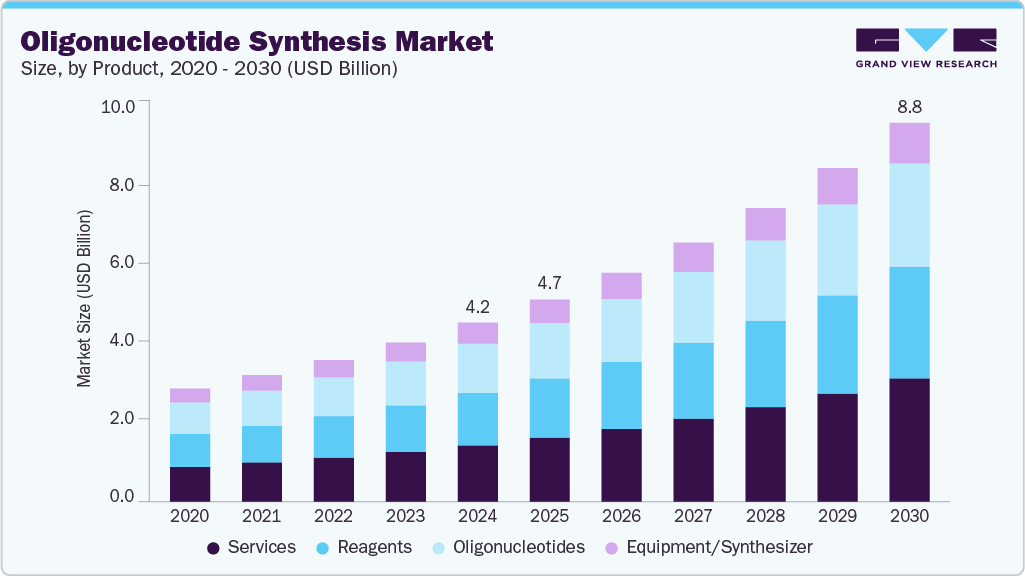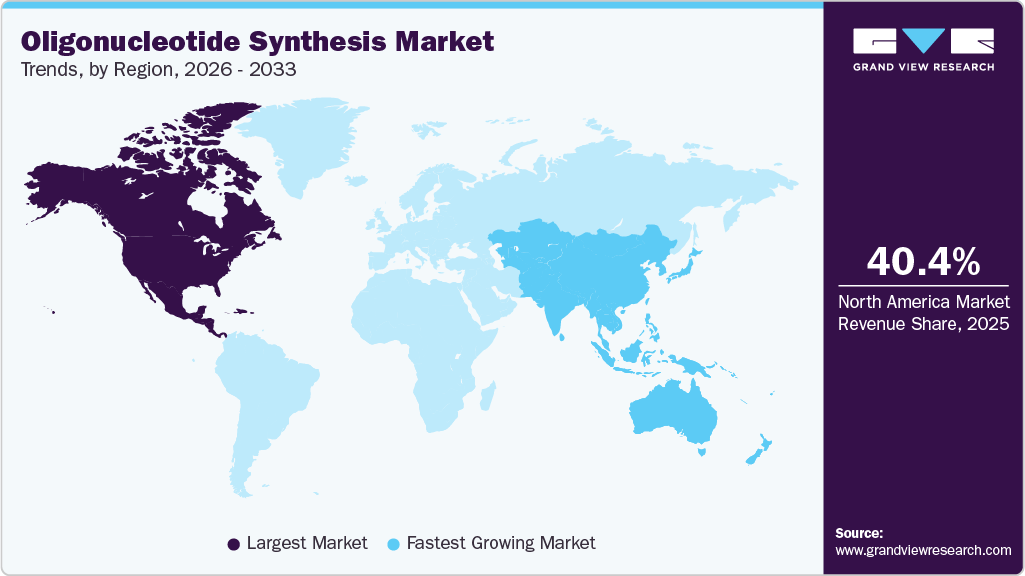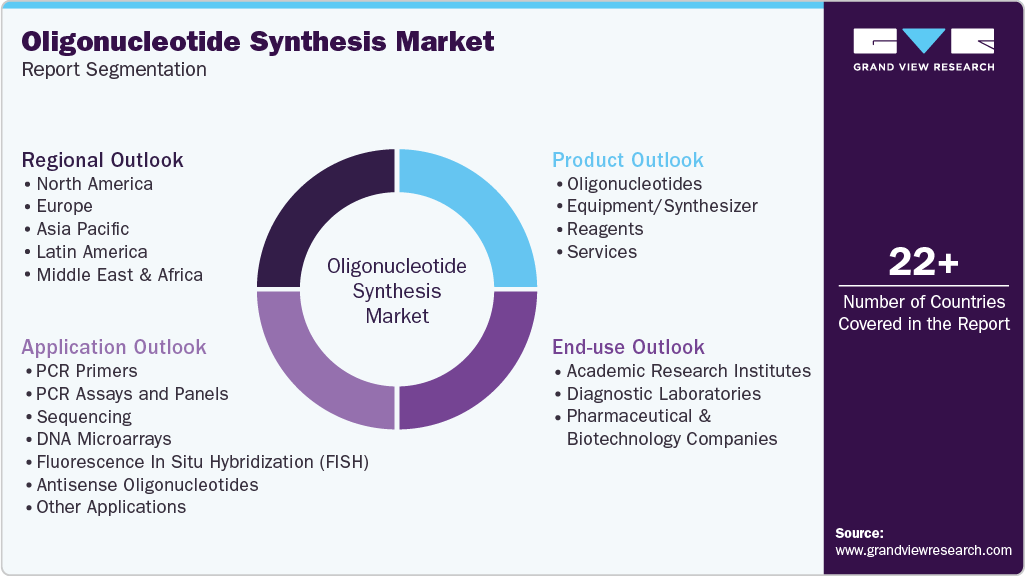- Home
- »
- Biotechnology
- »
-
Oligonucleotide Synthesis Market Size & Share Report, 2033GVR Report cover
![Oligonucleotide Synthesis Market Size, Share & Trends Report]()
Oligonucleotide Synthesis Market (2026 - 2033) Size, Share & Trends Analysis Report By Product & Service (Oligonucleotides, Reagents, Services, Equipment/Synthesizer), By Application (PCR Primers, Sequencing, DNA Microarrays), By End Use, By Region, And Segment Forecasts
- Report ID: GVR-2-68038-593-9
- Number of Report Pages: 150
- Format: PDF
- Historical Range: 2021 - 2024
- Forecast Period: 2026 - 2033
- Industry: Healthcare
- Report Summary
- Table of Contents
- Interactive Charts
- Methodology
- Download FREE Sample
-
Download Sample Report
Oligonucleotide Synthesis Market Summary
The global oligonucleotide synthesis market size was estimated at USD 3.64 billion in 2025 and is projected to reach USD 10.86 billion by 2033, growing at a CAGR of 14.95% from 2026 to 2033. Growth is driven by increasing use of oligonucleotides in therapeutics and diagnostics, rising genomics research investments, and technological advances in scalable synthesis, with strong demand from pharmaceutical and biotechnology companies supporting market expansion.
Key Market Trends & Insights
- The North America oligonucleotide synthesis market held the largest share of 40.37% of the global market in 2025.
- The oligonucleotide synthesis industry in the U.S. is expected to grow significantly over the forecast period.
- By product & service, the oligonucleotides segment accounting for the largest revenue share of 32.30% in 2025.
- By application, PCR primers led the industry with the largest revenue share in 2025.
- By end use, the academic research institutes dominated with the largest revenue share in 2025.
Market Size & Forecast
- 2025 Market Size: USD 3.64 Billion
- 2033 Projected Market Size: USD 10.86 Billion
- CAGR (2026-2033): 14.95%
- North America: Largest market in 2025
- Asia Pacific: Fastest growing market

Growth of Nucleic Acid-Based Therapies
The primary factor responsible for the growth of the oligonucleotide synthesis market is the rapidly growing nucleic acid-based therapies. High-precision oligonucleotides are needed for therapeutic measures like antisense oligonucleotides, siRNA, mRNA therapies, and gene-editing technologies, which, in turn, require more accurate and more extensive synthesis. Moreover, the increasing number of regulatory approvals and the ongoing strong clinical pipeline against genetic, oncological, and infectious diseases are also contributing to the growth of the market.
List of approved NA therapeutics (up to 2024)
RNA Type
Drug Name(s)
Target Profile
Developer(s)
ASO
Fomivirsen
Eye, CMV retinitis; binds and degrades UL123 mRNA, inhibits IE2 protein
Ionis
ASO
Mipomersen
Liver, homozygous familial hypercholesterolemia; ApoB-100 mRNA degradation
Kastle Therapeutics, Ionis
ASO
Nusinersen
CNS, spinal muscular atrophy; SMN2 pre-mRNA splicing
Ionis
ASO
Eteplirsen
Muscle, DMD; exon 52 skipping of DMD
Sarepta
ASO
Inotersen
Liver, familial amyloid polyneuropathy; inhibits TTR mRNA translation
Ionis
ASO
Milasen
CNS, Batten disease (CLN7); CLN7 mRNA splicing
Boston Children’s Hospital
ASO
Golodirsen
Muscle, DMD; exon 53 skipping of DMD
Sarepta
ASO
Viltolarsen
Muscle, DMD; exon 53 skipping of DMD
NS Pharma
ASO
Casimersen
Muscle, DMD; exon 45 skipping of DMD
Sarepta
ASO
Eplontersen
Polyneuropathy of hATTR amyloidosis
AstraZeneca, Ionis
siRNA
Patisiran
Liver, polyneuropathy; inhibits TTR mRNA translation
Alnylam
siRNA
Givosiran
Liver, acute hepatic porphyria; ALAS1 mRNA downregulation
Alnylam
siRNA
Lumasiran
Liver, PH1; HAO1 mRNA targeting
Alnylam
siRNA
Inclisiran
Liver, ASCVD; PCSK9 mRNA downregulation
Novartis
siRNA
Vutrisiran
Liver, hATTR amyloidosis; TTR mRNA
Alnylam
siRNA
Nedosiran
Primary hyperoxaluria
Dicerna
Aptamer
Pegaptanib
Eye, AMD; VEGF165 inhibition
Bausch + Lomb
Aptamer
Izervay
Eye, geographic atrophy; C5 inhibition
Iveric Bio, Astellas
mRNA
BNT162b2
COVID-19 vaccine; SARS-CoV-2 spike protein expression
BioNTech, Pfizer
mRNA
mRNA-1273
COVID-19 vaccine; SARS-CoV-2 spike protein expression
Moderna
CRISPR-Cas9
Casgevy
Blood; CRISPR-Cas9 editing of CD34+ HSPCs
Vertex, CRISPR Therapeutics
Source: Molecular Therapy Nucleic Acid, Secondary Research, Grand View Research
At the same time, pharmaceutical and biotechnology companies are gradually transferring their oligonucleotide synthesis processes to specialized providers for the sake of research, clinical development, and marketing. The increasing sophistication of therapeutic designs, such as modification with chemicals and long-chain oligos, is the main reason for the demand for high-tech synthesis skills, proving the market’s long-term growth potential even more.
Rising Use in Molecular Diagnostics
Molecular diagnostic techniques are becoming more widespread, and they are the main reason for the increasing demand in the oligonucleotide synthesis market. Oligonucleotides are vital for PCR, qPCR, NGS, and hybridization-based assays, thus enabling the applications in disease detection, pathogen identification, and genetic testing. The growing demand for high-quality oligonucleotides stems from the ongoing use of molecular diagnostics in clinical laboratories and the production of diagnostic kits.
In addition, the expansion of precision medicine and companion diagnostics is further boosting market growth. Targeted diagnostic tests require highly customized oligonucleotides to ensure accuracy and reliability. At the same time, rising testing volumes in oncology, infectious diseases, and genetic disorders continue to support long-term demand for scalable oligonucleotide synthesis.
Market Concentration & Characteristics
The oligonucleotide synthesis industry is characterized by a moderate to high degree of innovation due to rapid advancements in gene editing technology. Gene editing technology - Clustered Regularly Interspaced Short Palindromic Repeats (CRISPR) is projected to be the most influential and innovative technology in biotechnology.
The oligonucleotide synthesis sector is further characterized by a moderate level of merger and acquisition (M&A) activity by the leading players. This is due to several factors, including the desire to gain access to new DNA & RNA facilities, increase their capabilities, expand product portfolios, and improve competencies. For instance, in January 2025, Maravai LifeSciences acquired Molecular Assemblies’ intellectual property and assets, strengthening TriLink BioTechnologies’ enzymatic DNA synthesis capabilities for advanced mRNA, oligonucleotide, and CRISPR manufacturing applications.

Regulatory requirements for quality, safety, and GMP compliance increase production complexity and costs in the oligonucleotide synthesis industry. At the same time, clearer approval pathways for nucleic acid-based therapies support market growth and favor compliant manufacturers.
Product expansion in the oligonucleotide synthesis industry is driven by demand for customized, chemically modified, and GMP-grade oligonucleotides for therapeutic and diagnostic applications, enabling companies to strengthen portfolios and address complex research and clinical needs.
Regional expansion in the oligonucleotide synthesis industry is driven by rising genomics research and biopharmaceutical demand, with companies establishing local facilities to meet regulatory requirements, improving supply chains, and serve key markets in North America, Europe, and the Asia Pacific. For instance, in December 2024, Co-Dx and CoSara Diagnostics Pvt. Ltd opened an oligonucleotide synthesis facility in Ranoli, India. Aligned with the “Make in India” initiative, the facility is designed to manufacture Co-Primers oligos in-house
Product & Service Insights
In 2025, the oligonucleotide synthesis industry was primarily driven by the increasing adoption of molecular diagnostics and oligonucleotide therapeutics, with the services segment contributing the largest share of 38.03% to the total revenue. Major companies are growing their presence through new market penetration.
The services segment is also projected to grow at the fastest CAGR in the oligonucleotide synthesis market due to increasing outsourcing by pharmaceutical and biotechnology companies seeking specialized, high-quality, and scalable synthesis capabilities while avoiding high infrastructure and regulatory compliance costs.
Application Insights
PCR primers led the oligonucleotide synthesis market in 2025 with a 20.58% share, driven by their use in sequencing, amplification, and advanced PCR techniques such as qPCR, RT-PCR, and digital PCR, which boosted demand for specialized designs and accurate gene expression analysis.
The sequencing segment is expected to grow at the fastest CAGR, driven by applications in genomics and genetic analysis, pathogen detection, and oligonucleotide-based assays. Market growth is further powered by the improvements in sequencing technologies and bioinformatics, like DNA Script's 2025 milestone, which allowed the production of custom DNA sequences of up to 500 nucleotides.
End Use Insights
In 2025, academic research institutes dominated the oligonucleotide synthesis market with a share of 44.48%, due to the applications of oligonucleotides in PCR, gene editing, mutagenesis, and diagnostics. In February 2025, the Jawaharlal Nehru India Centre for Advanced Scientific Research held the first Nucleic Acid Therapeutics Regional Meeting. The meeting fostered industry-based and academic research for the development of oligonucleotide therapeutics.

The pharmaceutical and biotechnology companies segment is expected to grow fastest over the forecast period. Oligonucleotides are key in modulating gene expression, targeting specific genetic sequences, and facilitating various molecular biology techniques. In September 2024, Lilly joined hands with Genetic Intelligence in a USD 409 million agreement to create RNA-targeted oligonucleotide therapies incorporating the AI technology Genetic Leap.
Regional Insights
North America led the oligonucleotide synthesis market in 2025 with the share of 40.37%, driven by numerous local companies and research institutes, strong demand from pharmaceutical and biotech firms, and Canada’s focus on personalized medicine and life sciences investments.

U.S Oligonucleotide Synthesis Market Trends
The United States oligonucleotide synthesis industry is growing rapidly. This market demand can be attributed to the country’s robust healthcare infrastructure, significant research and development investments, and a thriving pharmaceutical and biotechnology industry.
Europe Oligonucleotide Synthesis Market Trends
The Europe oligonucleotide synthesis market held a substantial market share in 2025. The European Union's funding programs and collaborative research initiatives contribute to the market's growth. In May 2025, in response to U.S. research funding cuts, Europe launched a USD 566 million initiative to attract top scientists from the U.S. The plan is expected to strengthen the European Research Council and offer "super grants" to top researchers.
The UK oligonucleotide synthesis market is growing rapidly, driven by increasing investments in genomics research, personalized medicine, and biotechnology, alongside strong government support and rising demand for oligonucleotide-based diagnostics and therapeutics.
The Germany oligonucleotide synthesis market is growing steadily, driven by strong pharmaceutical and biotech sectors, extensive research in molecular biology and genetics, and increasing adoption of oligonucleotide-based diagnostics and therapies.
Asia Pacific Oligonucleotide Synthesis Market Trends
The Asia Pacific oligonucleotide synthesis industry is projected to grow fastest at a 17.93% CAGR, driven by strategic collaborations, acquisitions, and rising initiatives in countries like Japan, China, and India, including new oligonucleotide production facilities. Increasing investments in biotechnology, growing research infrastructure, and government support for genomics and personalized medicine are further boosting market expansion.
The China oligonucleotide synthesis market led the regional market, accounting for the largest revenue share in 2025. This growth is primarily fueled by increased investments in biotechnology, rising research & development initiatives, and a growing demand for targeted therapies and diagnostics.
The Japan oligonucleotide synthesis market is rapidly expanding, fueled by cutting-edge genomics research, strong industry-academia collaborations, and the development of advanced oligonucleotide-based therapies and diagnostics.
Middle East & Africa Oligonucleotide Synthesis Market Trends
The oligonucleotide synthesis market in the Middle East & Africa is growing steadily, driven by increasing investments in biotechnology, expanding research infrastructure, and rising demand for oligonucleotide-based diagnostics and therapeutics.
The Kuwait oligonucleotide synthesis industry is emerging, driven by government initiatives to advance life sciences, collaborations with international biotech firms, and rising adoption of genetic research and personalized medicine.
Key Oligonucleotide Synthesis Company Insights
The oligonucleotide synthesis market is led by major players like Thermo Fisher, Merck KGaA, Danaher, Revvity, and Agilent, while innovators such as Bio-Synthesis, Kaneka Eurogentec, LGC Biosearch, Biolegio, and Twist Bioscience expand through customized solutions for research, pharma, and synthetic biology.
The market growth is primarily driven by the demand for high-quality oligonucleotides in genetic engineering, diagnostics, medicines, and synthetic biology, along with collaborations, mergers, and improvements in synthesis productivity, which the driving competition. The future of the market is being decided by companies that use innovation together with customer-focused solutions, as well as make their commitments to accessibility and ethical sourcing.
Key Oligonucleotide Companies:
The following key companies have been profiled for this study on the oligonucleotide synthesis market.
- Thermo Fisher Scientific Inc.
- Merck KGaA
- Danaher
- Revvity Discovery Limited
- Agilent Technologies, Inc.
- Bio-Synthesis, Inc.
- Kaneka Eurogentec S.A.
- LGC Biosearch Technologies
- Biolegio
- Twist Bioscience
Recent Developments
-
In December 2025, Aptamer Group and Alphazyme executed a licensing agreement granting Alphazyme non-exclusive rights to use Optimer synthetic aptamers for hot-start PCR, enhancing enzyme modulation and assay specificity.
-
In July 2025, Synoligo Biotechnologies launched a new e-commerce platform for oligonucleotide synthesis, providing researchers with streamlined ordering, advanced customization, fast delivery, and enhanced global access.
-
In May 2025, Oligo Factory launched a low-scale oligonucleotide synthesis capability at its Holliston, Massachusetts facility, expanding support for therapeutic, diagnostic, and life science researchers with flexible, rapid, and high-quality custom oligos.
Oligonucleotide Synthesis Market Report Scope
Report Attribute
Details
Market size value in 2026
USD 4.10 billion
Revenue forecast in 2033
USD 10.86 billion
Growth rate
CAGR of 14.95% from 2026 to 2033
Base year for estimation
2025
Historical data
2021 - 2024
Forecast period
2026 - 2033
Quantitative units
Revenue in USD million and CAGR from 2026 to 2033
Report coverage
Revenue forecast, company ranking, competitive landscape, growth factors, and trends
Segments covered
Product & service, application, end use, and region
Regional scope
North America; Europe; Asia Pacific; Latin America; MEA
Country scope
U.S.; Canada; Mexico; UK; Germany; France; Italy; Spain; Denmark; Sweden; Norway; India; China; Japan; Australia; South Korea; Thailand; Brazil; Argentina; Saudi Arabia; UAE; South Africa; Kuwait
Key companies profiled
Thermo Fisher Scientific Inc.; Merck KGaA; Danaher; Revvity Discovery Limited; Agilent Technologies, Inc.; Bio-Synthesis, Inc.; Kaneka Eurogentec S.A.; LGC Biosearch Technologies; Biolegio; Twist Bioscience
Customization scope
Free report customization (equivalent up to 8 analyst’s working days) with purchase. Addition or alteration to country, regional & segment scope.
Global Oligonucleotide Synthesis Market Report Segmentation
This report forecasts revenue growth and provides an analysis on the latest trends in each of the sub-segments from 2021 to 2033. For the purpose of this report, Grand View Research has segmented the global oligonucleotide synthesis market on the basis of product & service, application, end-use, and region:

-
Product & Service Scope Outlook (Revenue, USD Million, 2021 - 2033)
-
Oligonucleotides
-
Product type
-
DNA
-
Technology
-
Column-based
-
Array-based
-
-
-
RNA
-
Technology
-
Column-based
-
Array-based
-
-
Type
-
Short RNA Oligos (<65 nt)
-
Long RNA Oligos (>65 nt)
-
CRISPR (sgRNA)
-
-
-
-
-
Equipment/Synthesizer
-
Reagents
-
Services
-
DNA
-
Custom Oligo Synthesis Services
-
25 nmol
-
50 nmol
-
200 nmol
-
1000 nmol
-
10000 nmol
-
-
Modification Services
-
Purification Services
-
-
RNA
-
Custom Oligo Synthesis Services
-
25 nmol
-
100 nmol
-
1000 nmol
-
10000 nmol
-
-
Modification Services
-
Purification Services
-
-
-
-
Application Outlook (Revenue, USD Million, 2021 - 2033)
-
PCR Primers
-
PCR Assays and Panels
-
Sequencing
-
DNA Microarrays
-
Fluorescence In Situ Hybridization (FISH)
-
Antisense Oligonucleotides
-
Other Applications
-
-
End Use Outlook (Revenue, USD Million, 2021 - 2033)
-
Academic Research Institutes
-
Diagnostic Laboratories
-
Pharmaceutical and Biotechnology Companies
-
-
Regional Outlook (Revenue, USD Million, 2021- 2033)
-
North America
-
U.S.
-
Canada
-
Mexico
-
-
Europe
-
Germany
-
UK
-
France
-
Italy
-
Spain
-
Denmark
-
Sweden
-
Norway
-
-
Asia Pacific
-
China
-
India
-
Japan
-
South Korea
-
Australia
-
Thailand
-
-
Latin America
-
Brazil
-
Argentina
-
-
Middle East and Africa (MEA)
-
South Africa
-
Saudi Arabia
-
UAE
-
Kuwait
-
-
Frequently Asked Questions About This Report
b. Some key players operating in the oligonucleotide synthesis market include Thermo Fisher Scientific, Inc; Merck KGaA; Danaher Corporation; Dharmacon Inc.; Agilent Technologies, Inc.; Bio-Synthesis; Kaneka Eurogentec S.A.; LGC Biosearch Technologies; Biolegio; Twist Bioscience
b. Key factors that are driving the oligonucleotide synthesis market growth include the declining cost of sequencing, technological advancements in gene editing technologies, and rising investments in genetic research.
b. The global oligonucleotide synthesis market size was estimated at USD 3.64 billion in 2025 and is expected to reach USD 4.10 billion in 2026.
b. The global oligonucleotide synthesis market is expected to grow at a compound annual growth rate of 14.95% from 2026 to 2033 to reach USD 10.86 billion by 2033.
b. Services dominated the oligonucleotide synthesis market with a share of 38.03 % in 2025. This is attributable to the increasing demand for oligonucleotides in precision medicine.
Share this report with your colleague or friend.
Need a Tailored Report?
Customize this report to your needs — add regions, segments, or data points, with 20% free customization.

ISO 9001:2015 & 27001:2022 Certified
We are GDPR and CCPA compliant! Your transaction & personal information is safe and secure. For more details, please read our privacy policy.
Trusted market insights - try a free sample
See how our reports are structured and why industry leaders rely on Grand View Research. Get a free sample or ask us to tailor this report to your needs.










